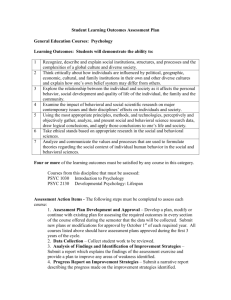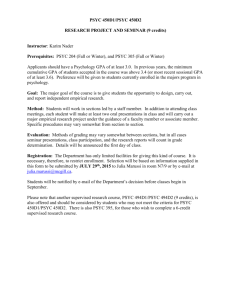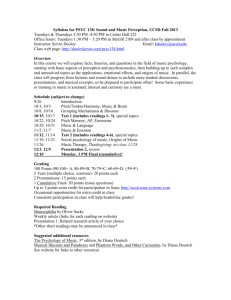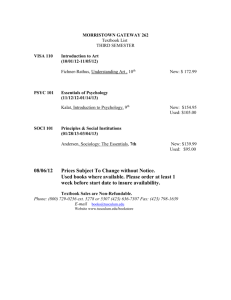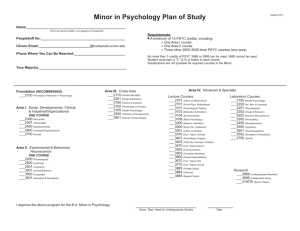department of psychological science
advertisement
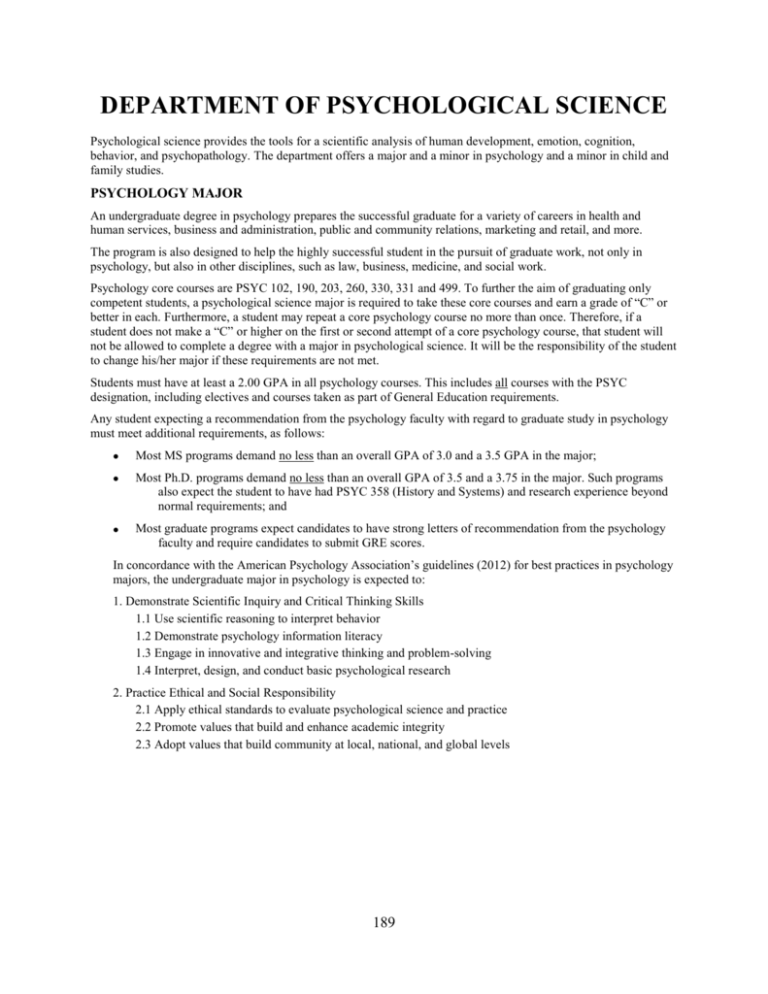
DEPARTMENT OF PSYCHOLOGICAL SCIENCE Psychological science provides the tools for a scientific analysis of human development, emotion, cognition, behavior, and psychopathology. The department offers a major and a minor in psychology and a minor in child and family studies. PSYCHOLOGY MAJOR An undergraduate degree in psychology prepares the successful graduate for a variety of careers in health and human services, business and administration, public and community relations, marketing and retail, and more. The program is also designed to help the highly successful student in the pursuit of graduate work, not only in psychology, but also in other disciplines, such as law, business, medicine, and social work. Psychology core courses are PSYC 102, 190, 203, 260, 330, 331 and 499. To further the aim of graduating only competent students, a psychological science major is required to take these core courses and earn a grade of “C” or better in each. Furthermore, a student may repeat a core psychology course no more than once. Therefore, if a student does not make a “C” or higher on the first or second attempt of a core psychology course, that student will not be allowed to complete a degree with a major in psychological science. It will be the responsibility of the student to change his/her major if these requirements are not met. Students must have at least a 2.00 GPA in all psychology courses. This includes all courses with the PSYC designation, including electives and courses taken as part of General Education requirements. Any student expecting a recommendation from the psychology faculty with regard to graduate study in psychology must meet additional requirements, as follows: Most MS programs demand no less than an overall GPA of 3.0 and a 3.5 GPA in the major; Most Ph.D. programs demand no less than an overall GPA of 3.5 and a 3.75 in the major. Such programs also expect the student to have had PSYC 358 (History and Systems) and research experience beyond normal requirements; and Most graduate programs expect candidates to have strong letters of recommendation from the psychology faculty and require candidates to submit GRE scores. In concordance with the American Psychology Association’s guidelines (2012) for best practices in psychology majors, the undergraduate major in psychology is expected to: 1. Demonstrate Scientific Inquiry and Critical Thinking Skills 1.1 Use scientific reasoning to interpret behavior 1.2 Demonstrate psychology information literacy 1.3 Engage in innovative and integrative thinking and problem-solving 1.4 Interpret, design, and conduct basic psychological research 2. Practice Ethical and Social Responsibility 2.1 Apply ethical standards to evaluate psychological science and practice 2.2 Promote values that build and enhance academic integrity 2.3 Adopt values that build community at local, national, and global levels 189 3. Communicate Effectively 3.1 Demonstrate effective writing 3.2 Exhibit effective presentation skills 3.3 Interact effectively with others 4. Engage in Professional Development 4.1 Apply psychological content and skills to career goals 4.2 Exhibit self-efficacy and self-regulation 4.3 Develop meaningful professional direction for life after graduation 5. Demonstrate a Knowledge Base in Psychology 5.1 Describe key concepts, principles, and overarching themes in psychology 5.2 Develop a working knowledge of psychology’s content domains 5.3 Describe applications of psychology PSYCHOLOGY MINOR A minor in psychology consists of 18 credit hours distributed as follows: PSYC 101 or PSYC 102 Electives: PSYC Elective PSYC Elective PSYC Elective (300-Level or above) PSYC Elective (300-Level or above) PSYC Elective (300-Level or above) TOTAL 3 3 3 3 3 3 18 hours Note: A student must take at least nine hours at the 300 level or above, earn no less than a “C” in PSYC 101 or PSYC 102, and maintain an average of 2.00 or above in the courses taken for the psychology minor. (For further information, contact the Department of Psychological Science.) 190 CHILD AND FAMILY STUDIES MINOR The objective of the child and family studies program is to encompass the entire life cycle while examining childhood and family as a developmental process. A major focus of the program is to facilitate an understanding of the entire developmental process through the dynamics of relationships within family units and through a crosscultural analysis of the diversity of the family systems. Core: 12 credit hours ECED 222 or SPED 223 PSYC 314 PSYC 315 SOCI 351 3 3 3 3 Electives: Minimum of nine credit hours from at least two disciplines PEES 325 PSYC 203 PSYC 303 PSYC 405 PSYC 416 SOCI 209 SOCI 314 SOCI 361 Total 21 semester hours Note: Students are advised to take at least one elective at the 300 level. A student must maintain an average of 2.00 or above in the courses taken for the Child and Family Studies minor. The minor is available to all students from across the University. (For further information, contact the Department of Psychological Science.) 191 2015-2016 PROGRAM REQUIREMENTS DEGREE: MAJOR: BACHELOR OF SCIENCE PSYCHOLOGY Credit Hours UNIVERSITY REQUIREMENTS FALS 101 Foreign Language Foreign Language UNI 101 1 0-3 0-3 1 GENERAL EDUCATION REQUIREMENTS (For approved courses see the General Education section.) Behavioral Science (SOCI 101 or ANTH 104) Fine Arts Global Issues/Nonwestern Studies History Humanities/Literature Humanities Laboratory Science Laboratory Science Logic & Analytical Thought (PHIL 103) Mathematics (MATH 211) Political Economy Wellness (PEES 175) Wellness (PEES 176) Writing (ENGL 101) Writing (ENGL 102) 3 3 3 3 3 3 4 4 3 3 3 2 1 3 3 TOTAL GENERAL EDUCATION AND UNIVERSITY REQUIREMENTS 46-52 MAJOR PROGRAM CORE REQUIREMENTS PSYC 102 PSYC 190 PSYC 203 PSYC 260 PSYC 330 PSYC 331 PSYC 499 3 1 3 3 4 4 2 192 MAJOR PROGRAM ELECTIVES PSYC PSYC (300-level or above) PSYC (300-level or above) PSYC (300-level or above) PSYC (300-level or above) 3 3 3 3 3 MAJOR PROGRAM AREA REQUIREMENTS Counseling and Well-Being (PSYC 212, 251, 312, 362 or 416) Developmental (PSYC 303, 314, 315, 405, or 416) Physiological/Cognitive/History (PSYC 304, 333, or 358) Social/Personality (PSYC 301, 302, 306, or 360) Experiential Learning (PSYC 221 or 299) PSYC 421, 490, or PSYC 300-level elective TOTAL MAJOR PROGRAM REQUIREMENTS 3 3 3 3 1 3 51 19-25 OTHER ELECTIVES TOTAL FOR BS DEGREE 122 Coursework must include at least 30 hours earned in 300 or above level courses, of which 12 hours must be in the major. See 4-year major guides for recommended order in which to take courses http://www.lander.edu/Academics/Registrar-Office/Resources/Major-Guides.aspx. 193

